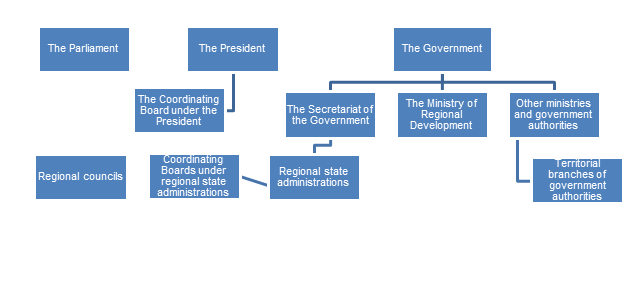A monitoring study on the National Strategy for Promoting Civil Society Development in Ukraine for 2016-2020 finds substantial gaps in its implementation. The Strategy aims to create favorable conditions for development of the civil society in Ukraine. Every year the Ministry of Regional Development prepares the Action plan to reach key objectives. Additionally, many public authorities are involved in creating the Strategy:
Unfortunately, the goals listed in the Action plans often do not correspond with the Strategy. Only 29% of the tasks in the Action plans correspond with Strategy’s objectives fully, 12% have partial correspondence, 10% insignificant correspondence and 49% do not correspond at all. The Monitoring study also found that the regions of Ukraine are even less successful in implementing the Strategy.
Region Not correspondent Partially correspondent Full correspondent
Volyn 16 (62%) 4 (15%) 6 (23%)
Odesa 15 (58%) 2 (7%) 9 (35%)
Sumy 15 (58%) 4 (15%) 7 (27%)
Kharkiv 10 (39%) 5 (19%) 11 (42%)
Action plans are drafted with a 4 to 7 months delay each year. The speed of approving the Programs and Action Plans is generally satisfactory in Volyn, Sumy and Kharkiv regions. In Odesa region, the speed of approval of the Program and the Action Plans is generally unsatisfactory.
The drafting process is sufficiently transparent at the national level. However, CSOs who are not a member of the Coordination Board (or another organization with institutionalized communication) require significant efforts to be involved in drafting and implementation. On the other hand, on the local level the mechanism of drafting is less transparent.
Overall, only 15% of the objectives were achieved, with 27% partially achieved and 58% not achieved. The monitoring study highlights the following problems:
- The system of the Strategy implementation does not function properly.
- Poor planning at all stages of executing the Action plan.
- Absence of a central budget to fund the implementation of the Action plans.
Based on the monitoring study results, the following recommendations are of key importance in developing future Strategies:
- Identify the range of legal forms for legal entities belonging to civil society organizations.
- Improve the deficiencies associated with the formulation of the tasks.
- Define the criteria for accomplishing tasks and activities.
- Establish clear deadlines for submitting proposals to the Action Plans.
- Define timing of activities and implementation of the Strategy.
- Harmonize the national and regional Strategies.
- Create a centralized budget to implement the Strategy.
- Ensure representation of local civil society organizations in the Coordination Council.
- Extend the power of the Coordination Council including the possibility to determine the accomplishment of tasks and activities.
- Identify the public authority responsible for the Strategy implementation and coordination so that the person responsible for the implementation of the Strategy holds the post of the Deputy Prime Minister.
- Involve amalgamated communities (” hromadas”) in implementation of the Strategy.
- Involve members of parliament in the work of the public authority coordinating the Strategy.
- Use the principles of gender planning.
The Agency for Legislative Initiatives presented the findings of their Monitoring Study “Implementation of the National Strategy for Promoting Civil Society Development in Ukraine for 2016-2020” on December 13. The study is part of the Europe Council project “Promoting civil participation in democratic decision-making in Ukraine”. It asseses the progress, achievements and examines the work of the executive authorities and the Coordinating Boards while implementing the Strategy. It analyzes the Strategy, its Action plans and the regional programs’ Action plans for the Volyn, Odesa, Sumy and Kharkiv regions.

